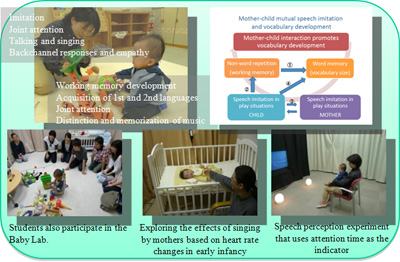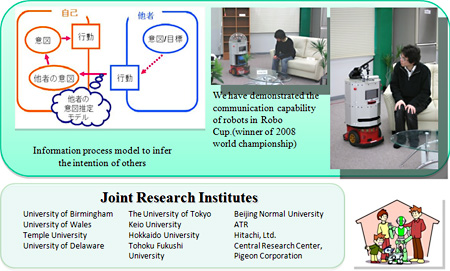- Home
- Program Outline
- Organization
- Research Group on Multi-dimensional Communication
Research Group on Multi-dimensional Communication
Multi-dimensional Communication is the establishment of mutual trust between the self and another, and is essential for communications as it includes inference and empathy of another's feelings as well as support of another's goals. As innovative technologies such as robotics and brain-machine interface permeate into the social living of human beings, requirements for robots and hi-tech machines alike to implement the abilities of generation and exertion of camaraderie or fellowship has been appeared inevitable. Our research group explore multi-dimensional understanding of interpersonal relationship construction through communication with notions of such diverse scientific fields of cognitive development, language and intelligence, and robotics.
Infant development research - Language development and mother-child interaction -
We conduct basic research on language development ("Tamagawa Baby Lab") with the goal of delivering education. The outcomes from it has been successfully demonstrated. We also design educational materials and programs("Kids Lab" and "Tamagawa Early Learning Project"), which attempt to apply the first-hand knowledge gained from the lab to genuine educational practices.
Major research theme
- Mother-child interactive vocal imitation to promote language development
- Mother-child conversations and joint attention in play situations
- Comprehension and inference processes of children while listning of English picture books
- Talking and singing by a parent to an infant to promote development of the infant's emotional language
- Research and practical applications of teaching methods for English education in elementary schools
Robotics research - Communication between humans and robots -
To establish smooth communication between humans and robots, we conduct research that attenpts to embed human mental mechanisms into robots. Knowledge of the gap between human behavior and mental processes is crucia in orderl to realize this. Generally speaking, mental processes of others cannot be observed. To compensate for this, human beings observe and learn about their own mind, and apply this knowledge to others to infer their feelings. We aim to formulate this process into an information processing model surmount.
Major research themes
- Behavior research to understand mental mechanisms in humans
- Formulization of mental processes into information processing models, and realization in robots


